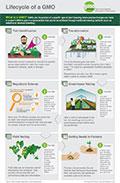Question
What is adventitious presence and is it fixed by CPB?
Submitted by: Musyoka Urbanus Musyoka
Answer
Expert response from Sarah Lukie
Managing Director, Regulatory and Multilateral Affairs, Plant Biotechnology at CropLife International
Tuesday, 14/01/2014 17:00
Within the context of biotech crops, adventitious presence or AP occurs when trace amounts of an agricultural biotech product that has not been approved for commercial use (e.g., research events, field trial escapes) by any competent government authority, but is found in the commercial crop or food supply despite best agricultural and manufacturing practices. In the context of agricultural biotechnology, a similar concept of low level presence or LLP is defined as the unintentional, low level presence of an agricultural biotech product approved in one or more countries, but not yet approved in the importing country. This means that the product has already undergone a full safety assessment and has been authorised for use in food, feed, grain and derived products by the competent government authority at least one country, but has not yet received this same assessment and authorisation in the importing country. The difference between LLP and AP of a biotech product therefore is the regulatory status of that product (with AP not having any regulatory approvals and LLP having at least one).
The Cartagena Protocol on Biosafety (CPB) also known as the Biosafety Protocol (BSP) is an international agreement governing the transboundary movement of living modified organisms or LMOs (essentially, most agricultural biotech products). The BSP has a provision (Article 18) which addresses the issue of handling, transport, packaging and identification of LMOs. Paragraph 2 of Article 18 sets out obligations on each BSP Party to take measures to require the identification of LMOs in accompanying shipping documentation. These identification requirements vary depending on the intended use of the LMOs (for use in food, feed or processing, or for research materials, or for cultivation). Therefore, this provision of the BSP addresses the issue of what is in a shipment of agricultural biotechnology products, in terms of identification of those products, but does not address LLP which is an issue of regulatory status of those products.
There is a process under way called the Global LLP Initiative which is a government-led initiative to develop a harmonized approach or set of approaches to address LLP at the global level. The Global LLP Initiative grew out of a meeting hosted by the Government of Canada for like-minded, interested countries to work collaboratively on the issue of LLP, with the understanding that finding global solutions to facilitate the management of LLP will reduce the likelihood of trade disruptions and increase transparency and predictability of trade. Meetings in March and September 2012 and in September 2013 brought together representatives from the following countries: Argentina, Australia, Brazil, Canada, Chile, China, Colombia, Costa Rica, European Commission, Indonesia, Japan, Mexico, Paraguay, Philippines, Russian, South Africa, Untied States, Uruguay and Vietnam. The next meeting is planned in the third quarter of 2014.
